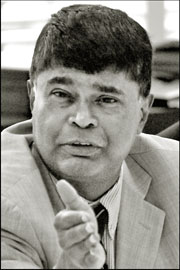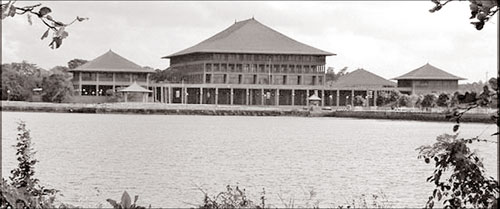|
Accountabiity and Parliamentary governance:
Liberal perspectives
Text of presentation by Prof Rajiva Wijesinha,
MP, at a meeting on the COPE Report arranged by Transparency
International, Sri Lanka, January 26, 2012
The First Report of the Committee on Public Enterprises of the
Seventh Parliament has drawn much attention of a favourable sort. The
speed with which the Report was issued, and the number of institutions
which it covers, comprehensively and incisively, was seen as unusual,
and a possible precursor to a better exercise of Parliamentary powers of
oversight than we had seen in the recent past.
|

Prof Rajiva Wijesinha, MP |
The principal credit for this must go to the chairman, DEW Gunasekara,
who chaired the Committee with inclusive dedication. But I think, as
indicated by his suggestion that I be asked to represent him at this
discussion, that he would also highlight the role of Liberal principles
which I was able to bring to bear on the work and the attitudes of the
Committee.
Promote consensual approaches
The first problem which we resolved was that of having to deal with a
vast number of institutions, only a few of which had been covered each
year in the past. The solution was obvious, and I could not understand,
when I suggested that we divide into sub-committees, why no one seemed
to have thought of it previously, when the work of the Committee had
expanded. Perhaps the explanation lay in the objection of one of those
members who had specialized in criticism in the past, that it was
necessary for the Committee to function as a whole.
But my response, that the sub-committees could report back to the
main Committee if warranted, was upheld by the chairman, and he
appointed three excellent chairs for the Sub-Committees, who competed
against each other as it were to ensure that they fulfilled their
responsibilities.
The principle, which would also help immeasurably in solving problems
with regard to ethnicity, may be termed that of subsidiarity, which in
this instance means breaking up big problems into smaller ones, and then
dealing with them systematically.
A second principle is that of inclusivity, working to promote
consensual approaches rather than confrontation. In this regard I must
pay tribute to the principle participant in COPE from the Opposition,
Eran Wickramaratne, perhaps the most outstanding example of how the
National List should be used to ensure knowledge and intelligence in
Parliament. He brings to bear his outstanding knowledge of financial
matters and principles of accountability with a sympathetic
understanding of problems that need to be overcome. He is also in
constant attendance, and prepared to concentrate on the whole report
placed before us by the Auditor General and the Treasury for
consideration, instead of merely indulging in flashes of corrosive
criticism.
New approach
|

Parliament, seat for democracy. File photo |
This leads on to the next principle, which I can best illustrate
through the characterization of the liberal perspective by the
relatively enlightened Marxist philosopher Ralph Miliband, father of the
far more obnoxious David. He wrote in Marxism and Politics:
In the liberal view of politics, conflict exists in terms of
‘problems’ which need to be ‘solved’. The hidden assumption is that
conflict does not, or need not, run very deep, that it can be managed by
the exercise of reason and good will, and a readiness to compromise and
agree. On this view, politics is not civil war by other means but a
constant process of bargaining and accommodation, on the basis of
accepted procedures, and between parties who have decided as a
preliminary that they could and wanted to live together more or less
harmoniously. Not only is this sort of conflict not injurious to
society, it has positive advantages: it is not only civilized, but also
civilizing. It is not only a means of resolving problems in a peaceful
way, but also of producing new ideas, ensuring progress, achieving ever
greater harmony and so on. Conflict is ‘functional’, a stabilizing
rather than a disruptive force.
We have adopted this principle in terms of our dealings with the
officials who come before us.
I was particularly concerned about this, because I had been on what
might be termed the receiving end of the aggression of Parliamentarians
when I was Secretary to the Ministry of Disaster Management and Human
Rights. Some members of the financial oversight committees were so rude
and overbearing that some public servants were extremely wary of
attending those committees. Indeed reading the papers in those days I
had the impression that some Parliamentarians were simply posturing, to
show how concerned they were about financial impropriety, and they were
using officials as tools for this purpose, to scold and then to claim
credit for having scolded.
The new approach we have adopted has been to try to work together
with officials, to praise those who have done well, to find out what
problems are and how we can set up procedures to minimize these, to
avoid concentration on formalities that limit efforts to prevent actual
abuse. In this regard I am pleased that I have had letters of
appreciation from some of those who have appeared before us, and one of
the most senior and respected public servants told me that the manner in
which I had transformed COPE had been much appreciated by his colleagues
still in service.
This does not mean that we should not be firm when there is wastage
or abuse of public funds, and the Report makes it clear that we have
highlighted areas in which improvement is required. This brings me to
the fourth area in which I was able to make a difference, namely that of
follow up, though whether we can do the same for the much more crucial
follow up our Report demands remains to be seen.
COPE office
The most preposterous element of COPE before the current chairman
took over was the lack of seriousness of its deliberations. Whilst at
meetings instructions were issued, absolutely nothing was done to ensure
that there was follow up. I discovered this only when, after a couple of
months, I began to ask about reports that we had requested.
I found then that, if such material was received, it was circulated
to members, but if it was not received, nothing was done. Essentially
the message that was conveyed was that it did not matter if nothing was
done, and by the time the Committee realized that nothing had been done,
at the next meeting at which the institution concerned was questioned,
since it would happen several years later, all previous omissions were
in effect forgotten.
This is a nonsensical way to proceed, though I should note that the
absence of urgency in the public service, which is mirrored by many
politicians, is one reason this country does not develop at the pace at
which it should, and we cannot hold only COPE guilty. But it was clear
to me that the staff of COPE had simply no idea about basic principles
of management. I therefore insisted on a system whereby schedules were
prepared of what had been requested from particular institutions, and
reminders sent when they failed to comply, with provision to summon them
again if there were lapses.
Public sector management
Why this had not happened in previous years I cannot explain, except
in terms of what I believe was a consequence of the lopsided Parliaments
of 1970 and 1977 and the failure of governments to train both
politicians and parliamentary staff better, the feeling that the
oversight role of Parliament was not a responsibility but yet another
mechanism for scoring political points.
I was horrified, and had to push my point, but the number of reports
we are now receiving suggests that the lesson is gradually being learnt.
In this regard though we must do better about the staff in the COPE
office, who have coped admirably with what they perhaps see as an
additional workload, but who have been unfailingly helpful when I make
demands on them. They need strengthening and more initiative on our
behalf must be encouraged.
But it is also essential to institute certain reforms in public
sector management. I draw attention in particular to recommendations 12
to 14 which suggest the need for streamlining and the development of
more comprehensive concepts of responsibility.
It is imperative I think that Financial and Administrative
Regulations be streamlined, with greater stress on outcomes rather than
procedures, on transparency rather than elaborate, wasteful and
time-consuming checks.
I have concentrated on the systems that we need to improve public
accountability, and I believe this is the way forward.
I believe there will be much concentration, in discussing our Report,
on individual cases, and I would agree that, where we have drawn
attention to lapses, these should be dealt with. But it is more
important to set in place procedures to make such lapses less likely in
the future, and to ensure that the public have access swiftly to
relevant information that will limit both abuse and the carelessness
that contributes to abuse.
We need to move on this not in a spirit of confrontation, not through
finger-pointing, for it is abundantly clear that waste and abuse are not
the preserve of one side in politics, but with the understanding that
systemic change is much more vital than tinkering with one or other
manifestation of irregularity. |



